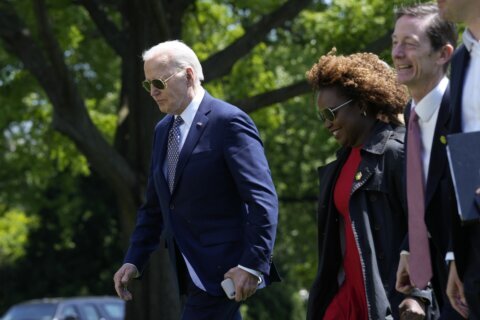(CNN) — President Joe Biden tied the wars in Ukraine and Israel together during a primetime Oval Office address Thursday, making an impassioned appeal to the American people to support two fellow democracies that he says are facing existential threats.
The president warned that the US and democracies around the world are at an inflection point amid a rising tide of threats from autocrats and terrorist groups. The United States plays a central role in allowing democracy to stand firm and the wars in Israel and Ukraine – while very different in the ways they are being fought and the history behind them – share critical factors in common.
“Hamas and Putin represent different threats, but they share this in common: They both want to completely annihilate a neighboring democracy, completely annihilate it,” Biden said.
“We can’t let petty partisan, angry politics get in the way of our responsibilities as a great nation. We cannot and will not let terrorists like Hamas and tyrants like Putin win. I refuse to let that happen,” he added.”
He laid out the stakes for the American people, calling the wars a national security imperative and a critical moment for the future of American leadership and democracies worldwide.
“American leadership is what holds the world together. American alliances are what keep us in America safe. American values are what make us a partner nation you want to work with,” he said. “To put all that at risk – we walk away from Ukraine, we turn our backs on Israel – it’s just not worth it.”
The primetime address took place on the eve of the White House requesting north of $100 billion from Congress to deliver aid and resources to Ukraine, Israel, Taiwan, and the US border with Mexico, even though the legislative branch is paralyzed by the dysfunction in the House of Representatives. Biden said he would be submitting an “urgent budget request” for supplemental funding for Israel and Ukraine, among other national security priorities.
“That’s why tomorrow I’m going to send to Congress an urgent budget request to fund America’s national security needs – needs to support our critical partners, including Israel and Ukraine. It’s a smart investment that’s gonna pay dividends for American security for generations,” Biden said.
While the White House believes there remains broad bipartisan support in Congress for the package, as three administration officials told CNN, real questions remain about the path for such a package with a leadership vacuum in the House of Representatives and consternation about federal spending levels that have cast into question the government’s ability to fund itself beyond mid-November.
The Biden administration in August delivered its last so-called supplemental funding request, which encapsulates unique requests beyond traditional government programs. The proposal requested $24.1 billion to aid Ukraine through the end of the year, but Congress failed to approve it during a process to greenlight short-term federal funding.
Public opinion regarding US assistance has been mixed.
In a recent CNN poll, nearly all respondents were sympathetic with the Israeli people in the wake of surprise attacks launched by Hamas, but there was no clear consensus on the right level of US involvement. One-third (35%) said the US is providing the right amount of assistance – and another 36% were unsure whether the level of US assistance is appropriate. The US has long provided security assistance to Israel, which receives roughly $4 billion annually under a 10-year memorandum of understanding. The new request would provide billions more.
By contrast, support to sustain aid to Ukraine has waned significantly since Russia’s unprovoked invasion in February 2022. An August CNN poll found 55% of respondents said Congress should not pass more funding to aid Ukraine. The partisan divide has been deepening, too: Nearly three-quarters of Republicans opposed more funding for Ukraine, while 62% of Democrats supported it.
Since Russia’s invasion, the White House and Congress have provided more than $75 billion in funding to Kyiv, according to the Kiel Institute for the World Economy.
Treasury Secretary Janet Yellen pledged to European leaders on Monday that the US would be able to secure support for additional aid and, in an interview with Sky News, said Washington could afford financing two war efforts at once.
“American can certainly afford to stand with Israel and to support Israel’s military needs, and we also can and must support Ukraine in its struggle against Russia.”
The speech comes on the heels of his wartime visit to the Middle East, which went on even after a blast tore through a hospital in Gaza. While his planned stop in Amman, Jordan, to meet Arab leaders was canceled just as the president was preparing to depart the White House, Biden did spend hours on the ground in Tel Aviv.
Officials on Wednesday sought to downplay the cancellation, saying it was natural for President Mahmoud Abbas of the Palestinian Authority to return to the West Bank to mourn the dead. Later, Biden scoffed at the suggestion he was disappointed the meeting had been canceled.
“Disappointed? Look, I came to get something done. I got it done,” he said. “Not many people thought we could get this done, and not many people want to be associated with failure.”
For Biden, a trip in the formative days of a potentially drawn-out conflict amounted to the ultimate test of his confidence – built over decades – that getting in the same room can influence people and events.
The US, Egypt and Israel have all signaled readiness for aid to begin moving into Gaza, following Biden’s high-profile visit. However, the Rafah crossing from Egypt to Gaza is not expected to open Friday for a convoy of humanitarian aid to get into Gaza, multiple sources told CNN, despite expectations voiced by Biden and others that it would be open.
“I would not put money on those trucks going through tomorrow,” one source familiar with the discussions told CNN.
in a meeting that stretched well past what officials had expected, Biden sought to use his decades-long relationship with Israeli Prime Minister Benjamin Netanyahu – one that has endured significant strain over the past year – to offer advice and seek commitments on the flow of humanitarian aid to Gaza.
Beforehand, officials said Biden would approach the Israeli leader with “tough questions” about the path forward and Israel’s intentions as it seeks to eliminate Hamas in Gaza. Speaking later, Biden offered a glimpse of how those conversations went, or at least his side of them.
“I caution this: While you feel that rage, don’t be consumed by it,” Biden told his audience, a collection of Israelis and Americans.
“I know the choices are never clear or easy for the leadership,” Biden went on, recalling mistakes the United States made after the September 11, 2001, terrorist attacks. “There’s always cost, but it requires being deliberate, requires asking very hard questions. That requires clarity about the objectives and an honest assessment about whether the path you’re on will achieve those objectives.”
This is a breaking news story and will be updated
The-CNN-Wire
™ & © 2023 Cable News Network, Inc., a Warner Bros. Discovery Company. All rights reserved.







